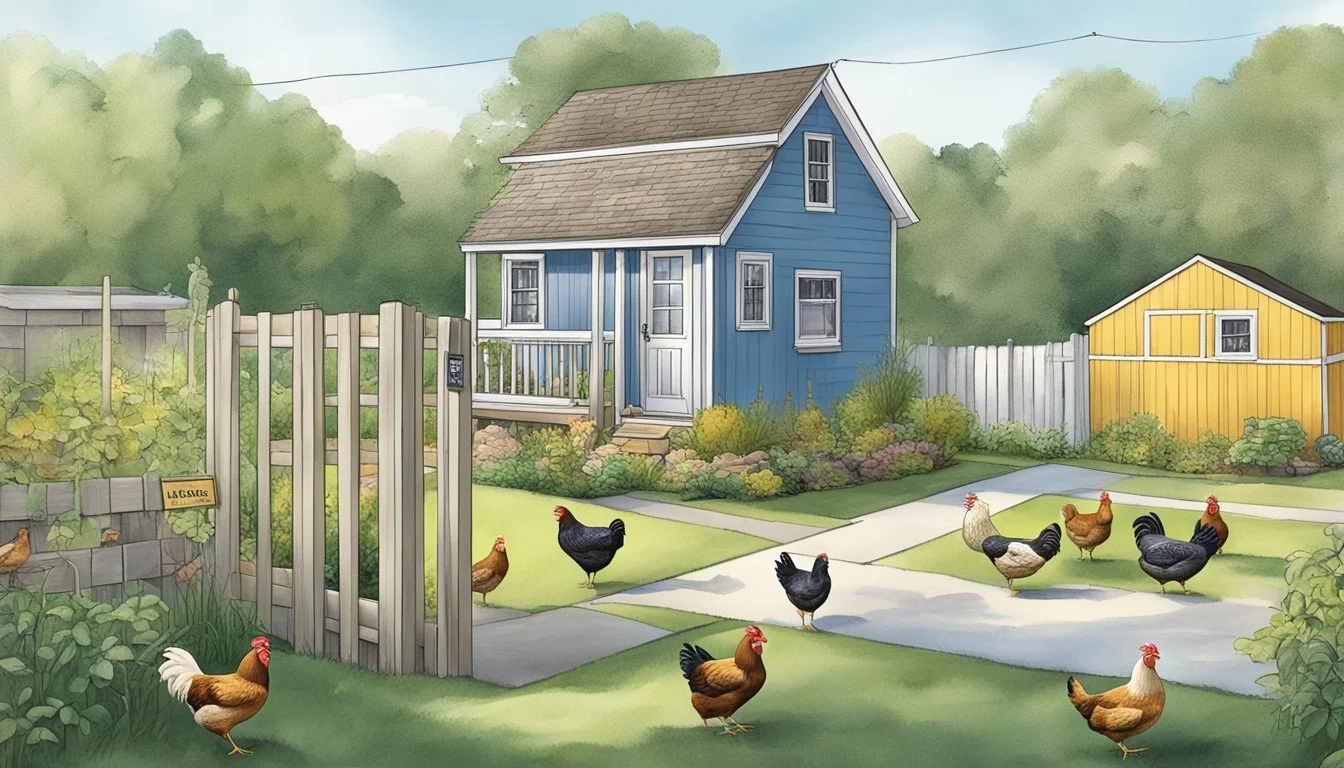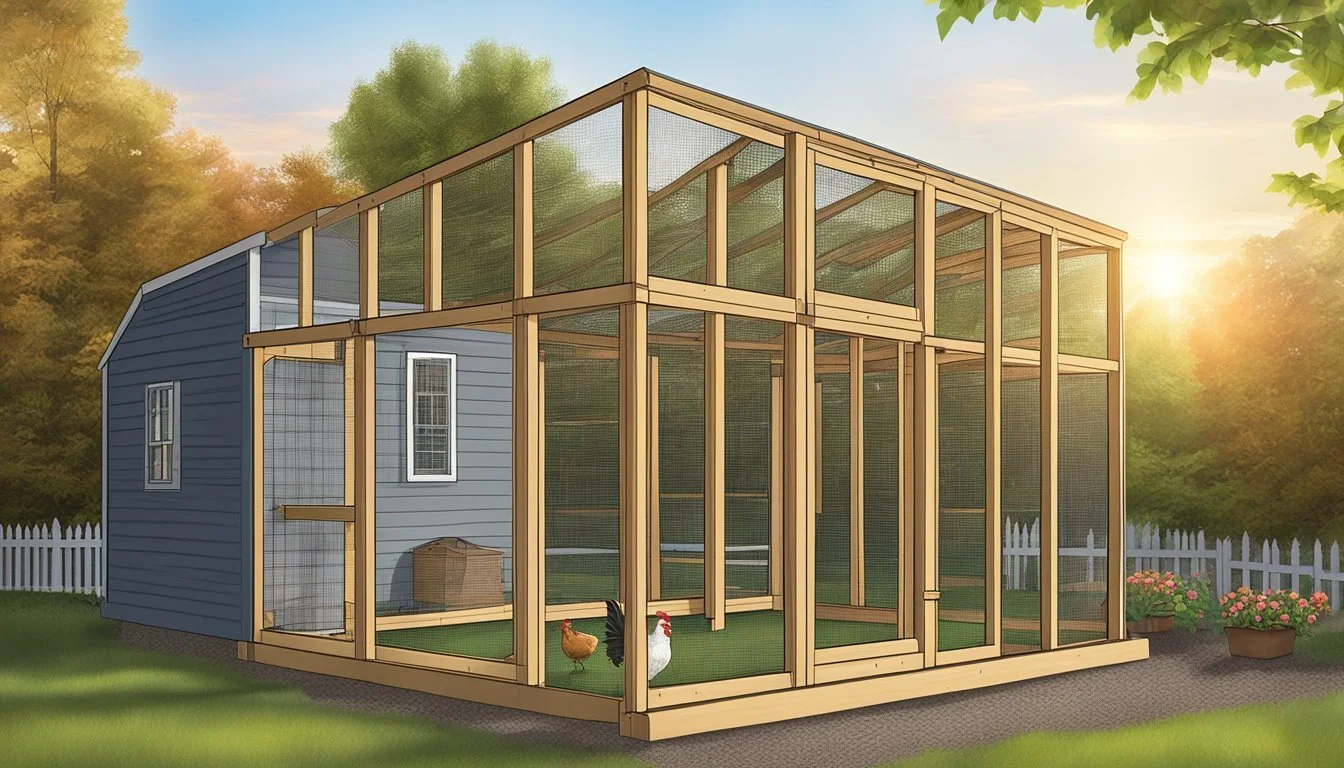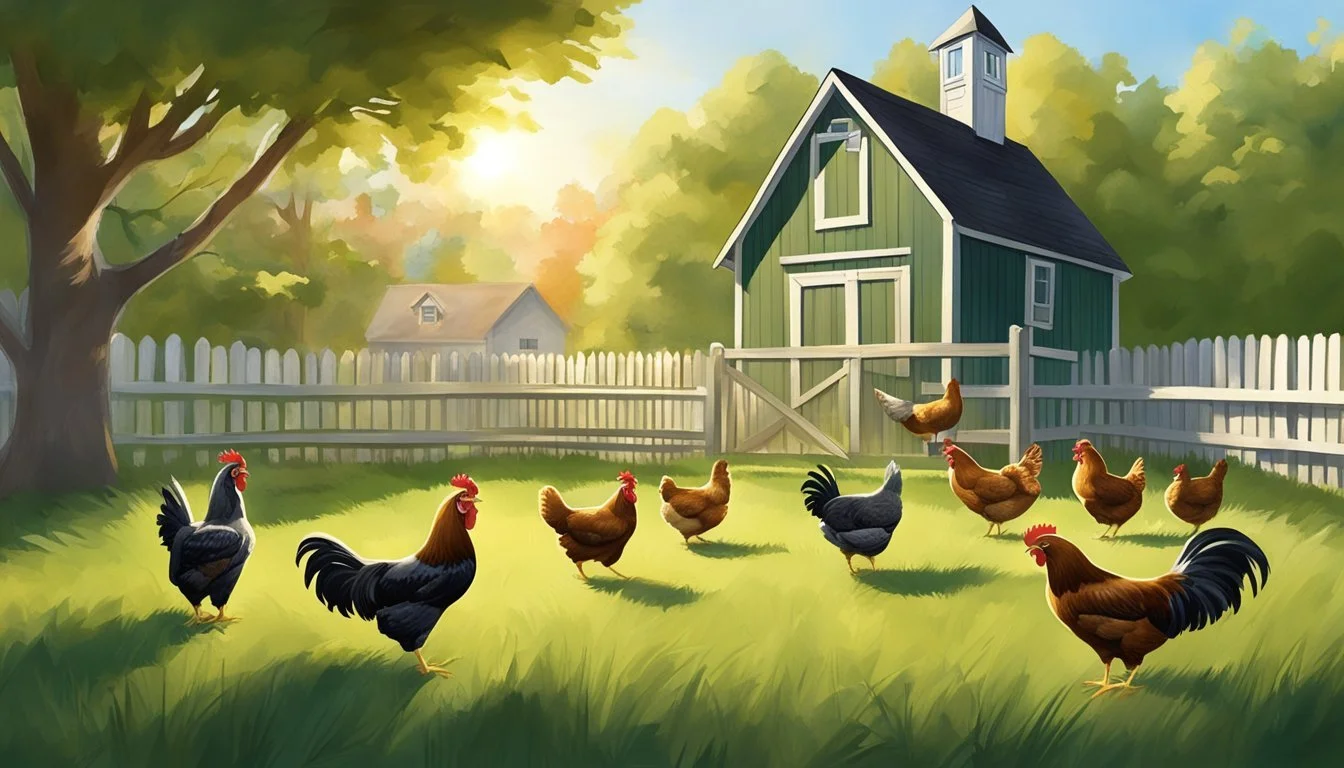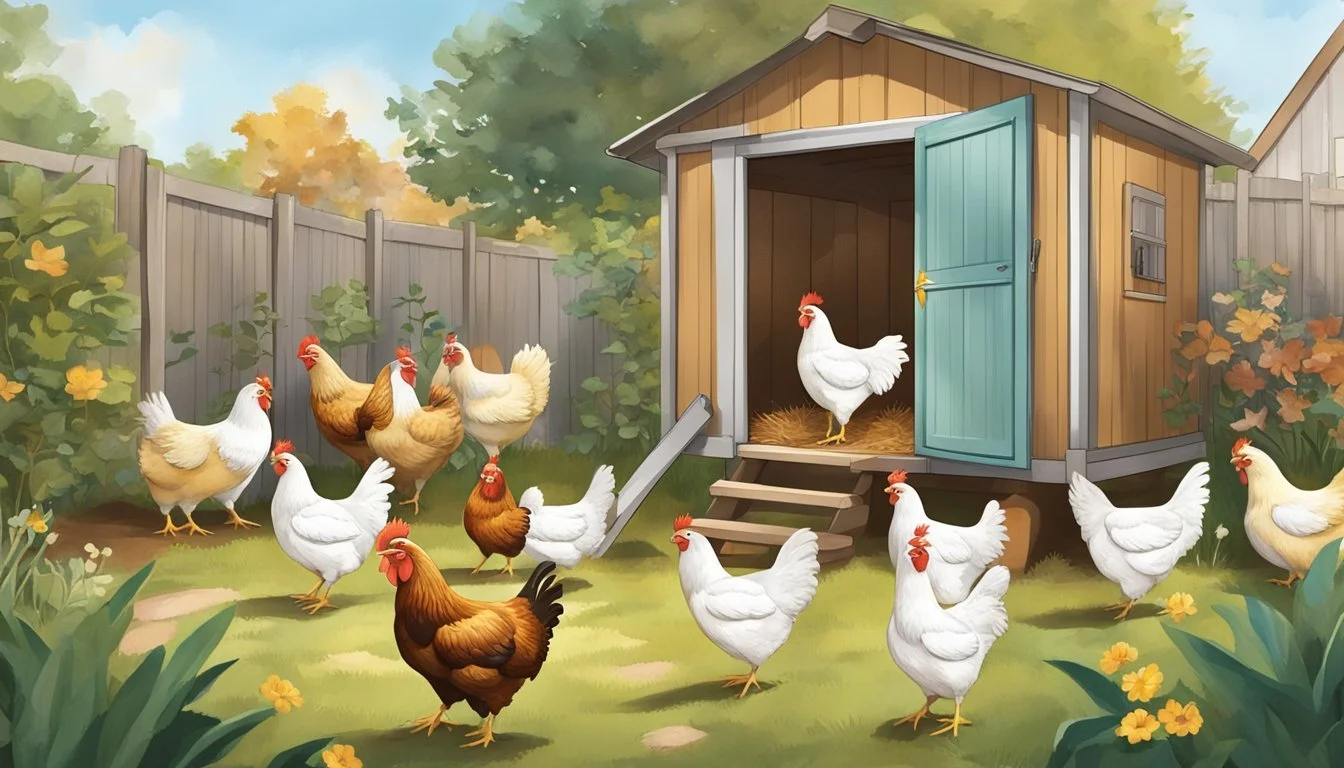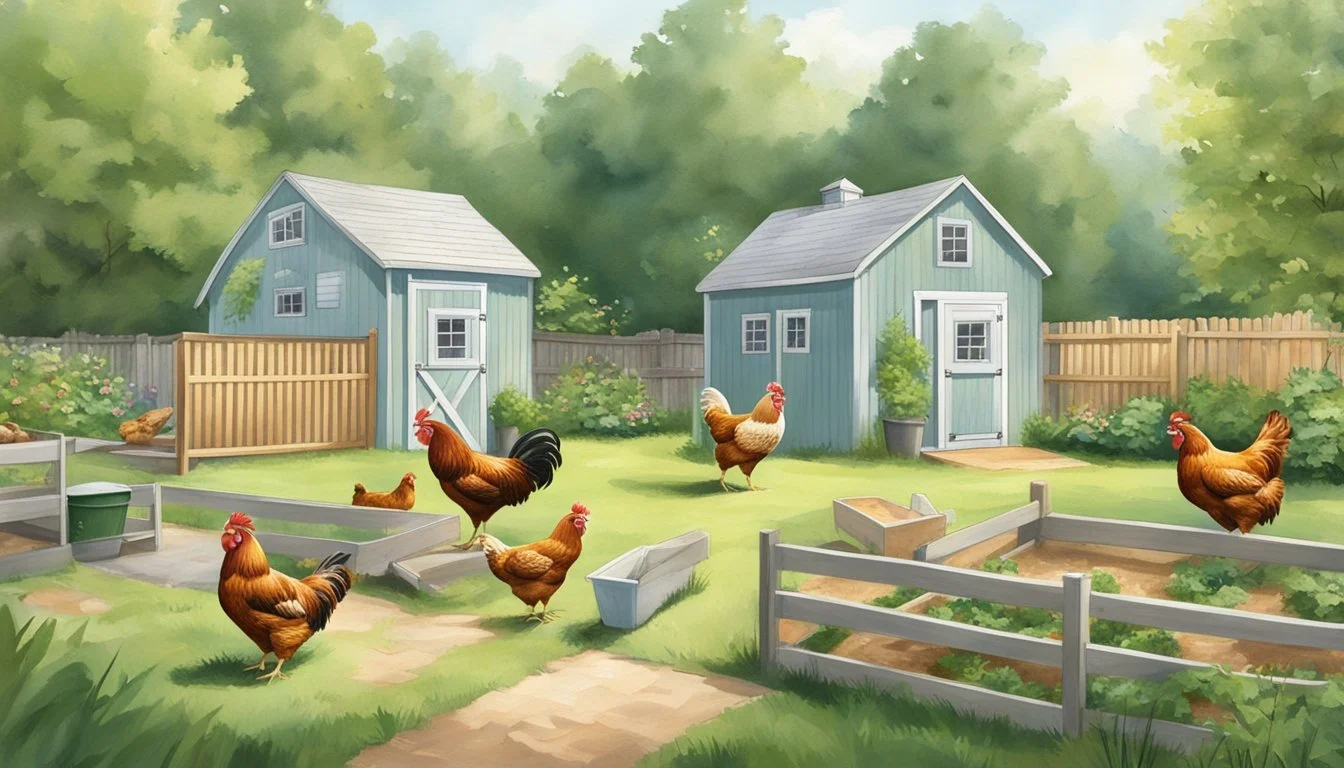Keeping Backyard Chickens in Manchester, NH
A Guide to Local Regulations and Best Practices
Keeping backyard chickens has gained popularity in cities across the United States as a way for residents to enjoy fresh eggs, natural pest control, and the pleasures of animal care. Manchester, New Hampshire, is no exception to this trend. The city has specific ordinances in place that allow residents to raise chickens in their backyards under certain conditions.
Residents of Manchester are permitted to keep up to six domestic chickens. This provides a unique opportunity for urban agriculture within the city limits, melding the joys of rural lifestyle with urban convenience. However, it's essential for potential and current chicken owners to be aware of and comply with the local ordinances pertaining to the care and keeping of chickens to ensure a harmonious and proper integration into the community.
Properly caring for backyard chickens in Manchester means not just adhering to legal guidelines but also recognizing the specific needs of these birds, especially in the cold New Hampshire winters. Taking appropriate measures to safeguard the chickens' well-being ensures that they remain healthy and productive throughout the year, fostering a sustainable and enjoyable backyard farming experience.
Understanding Local Ordinances
When considering keeping backyard chickens in Manchester, NH, residents must navigate a series of local and state-level ordinances. It is essential to understand the specific permit requirements and nuisance regulations to ensure compliance.
City of Manchester Ordinances
In Manchester, the Planning and Community Development Department stipulates that a minimum of one acre is required to maintain animals classified as livestock, which includes chickens. This ordinance reflects the city's commitment to upholding public health and safety while allowing for certain agricultural practices.
New Hampshire Chicken Ordinances
Unlike Manchester, the state of New Hampshire does not enforce specific statewide guidelines on raising backyard chickens. Instead, regulations are determined by local city or county ordinances. Thus, the rules can vary greatly from one municipality to another, necessitating that prospective chicken keepers consult their local ordinances for guidance.
Permit Requirements
For those residing in Manchester, it is advised to contact the local Planning and Community Development Department to inquire about necessary permits for keeping chickens. The department's contact number is (603) 624-6450, although it's also prudent to directly consult the city's ordinances for the most updated information.
Nuisance Regulations
The city of Manchester has ordinances in place to address potential nuisances that may arise from keeping chickens. These regulations typically cover aspects such as noise, odors, property maintenance, and waste management to minimize any negative impact on the surrounding community. Adherence to these regulations is crucial to avoid penalties and maintain the allowable practice of raising chickens in a residential area.
Setting Up Your Chicken Coop
When establishing a chicken coop in Manchester, NH, it is crucial to adhere to local regulations and ensure proper construction for the welfare of the chickens. The coop must offer a secure and comfortable environment that meets the birds' needs.
Coop Size and Location
The coop should be spacious enough to provide at least 3-4 square feet per chicken inside and at least 10 square feet in the outdoor run. Location is governed by the city’s guideline, which mandates that a property must be a minimum of 1/2 acre, with coops and fenced areas placed in side or rear yards, at least 20 feet from property lines.
Minimum property size: 1/2 acre
Coop placement: Side or rear yards
Setback requirement: 20 feet from property lines
Coop Construction and Ventilation
A well-constructed coop ensures chickens' safety and comfort. It should not exceed 6 feet in height. Ventilation is key to maintaining a healthy living space and must be factored into coop design to allow for adequate air flow without creating drafts.
Height restriction: Not to exceed 6 feet
Ventilation: Must provide adequate air flow
Security Against Predators
The coop must be fortified against predators with sturdy enclosures and secure latches. Structures should be designed to prevent the entry of common predators such as raccoons, foxes, and birds of prey.
Enclosures: Must be predator-resistant
Locks: Secure latching mechanisms required
Maintaining Sanitary Conditions
Sanitary conditions are maintained by regular cleaning and the use of appropriate bedding material, which should be changed frequently to prevent the buildup of waste. This creates a healthy environment for the chickens and reduces the risk of disease.
Bedding: Must be kept clean and changed regularly
Cleanliness: Regular coop cleaning is necessary
Raising Chickens in Manchester
In Manchester, New Hampshire, raising backyard chickens is embraced by residents interested in sustainable living, access to fresh eggs, and the personal enjoyment of poultry husbandry. They must adhere to local regulations to ensure a harmonious integration within the urban environment.
Breeds Suitable for Local Climate
The New Hampshire climate necessitates selecting breeds that are hearty enough to endure cold winters. The New Hampshire Red and Plymouth Rock are excellent options for Manchester's weather, due to their resilience and effective egg-laying even in colder temperatures.
Feeding and Nutrition
Chickens in Manchester require a balanced diet comprising grains, proteins, and greens. Layer feed provides essential nutrients for egg-laying hens, incorporating an appropriate amount of calcium for strong eggshells. Owners can supplement diets with kitchen scraps and garden greens, ensuring the chickens are not fed harmful foods like chocolate or avocado.
Typical feed ratio for adult chickens:
Grains: 70%
Protein (e.g., mealworms): 20%
Greens and other scraps: 10%
Healthcare and Maintenance
Regular maintenance, including inspections for parasites and diseases, is critical for a healthy flock. Manchester residents should provide clean, dry, and ventilated housing to prevent respiratory issues. Access to a veterinarian familiar with poultry is advisable for preventive care and treatment of potential health issues.
Egg Production and Usage
Egg production is influenced by the breed of chicken and the season, with most hens laying fewer eggs in winter. In Manchester, backyard chicken enthusiasts can typically expect 4-6 eggs per week per hen. The sale of eggs may be regulated, and individuals who wish to sell must ensure compliance with local ordinances. For personal use, fresh eggs should be collected daily and can be stored at room temperature for several weeks or refrigerated.
Nesting boxes should be filled with clean, soft materials to encourage laying and ease of egg collection.
By respecting city regulations that limit the number of chickens allowed to a maximum of six on one acre, keeping coops at least 20 feet from neighbor's dwellings, and not engaging in commercial sales, Manchester citizens can enjoy the benefits of raising chickens responsibly.
Legal and Social Considerations
In Manchester, NH, residents who wish to keep backyard chickens must navigate various regulations and maintain good relations with their community. It's critical to understand the distinction between pets and livestock, how property lines factor in, and the process of handling grievances.
Livestock vs. Pet Distinction
In Manchester, backyard chickens are considered livestock, and not pets. This distinction is important as it influences the regulations regarding their keeping within residential areas. Local ordinances stipulate specific requirements to legally house chickens in a residential setting. For instance, the property must be at least 1/2 acre in size to keep chickens.
Property Line and Neighbor Relations
Compliance with property line setbacks is mandatory to maintain neighborly relations and adhere to legal standards. Chicken coops and fenced areas must be set back a minimum of 20 feet from property lines. Such regulations serve to minimize nuisance to neighbors and reflect the community's commitment to respecting shared residential boundaries.
Structures housing chickens should be placed in side or rear yards only.
No part of the enclosure can encroach within a 20-foot perimeter of the neighboring property line.
Handling Complaints and Petitions
When there are community concerns or nuisance complaints, Manchester residents may address them through formal processes. A petition may be filed to request an amendment to ordinances governing the keeping of backyard chickens. This reflects the city's open approach to evolving community standards and ensures that all residents’ voices are heard in local governance. Complaints are typically reviewed by the city's Board of Aldermen, who are tasked with maintaining balance between individual and community interests.
Managing Waste and Composting
In Manchester, NH, responsible backyard chicken owners understand that managing waste is critical for maintaining a sanitary condition and supporting a sustainable ecosystem. Composting offers an effective solution to repurpose chicken manure into a valuable resource.
Manure Composting and Storage
Enclosed Structure: The city's regulations require composting to occur in an enclosed structure or container.
Quantity: No more than 3 cubic feet of manure may be stored on any lot at a time.
Purpose: To reduce odors and maintain cleanliness.
The Process
Waste Collection: Owners should regularly clean out their chicken coops to gather manure.
Composting Bins: Place the manure in compost bins or barrels, along with yard and food scraps.
Benefits
Fertilization: Composted material becomes a nutrient-rich fertilizer, ideal for gardens.
Waste Reduction: It helps diminish waste production, aligning with eco-friendly practices.
Health and Safety
Sanitary Conditions: Proper composting negates potential risks of contamination and keeps the coop environment healthy.
Regular Cleaning: Routine maintenance of the composting site is essential to prevent vermin or odor problems.
To ensure compliance with local ordinances and maintain a healthy backyard chicken environment, one must implement a rigorous waste management plan centered around thorough and effective composting practices.
Community and Educational Aspects
In Manchester, NH, the practice of keeping backyard chickens not only serves as a source of sustenance but also enriches the local community and provides educational opportunities, particularly for children.
Sharing Experience with Locals
Community members often share their experiences with backyard chickens, creating a supportive network for both novices and seasoned chicken enthusiasts. They exchange tips on best practices for chicken care, including coop construction and protection against predators. Local social media groups and forums like the Manchester NH Residents for Backyard Chickens on Facebook have become hubs for such exchanges, fostering a collaborative environment.
Local Forums: Exchange of tips, chicken care best practices, and community support.
Facebook Groups: Online communities for sharing experiences and advice.
Educating Children on Chicken Care
Backyard chickens present a practical avenue for hands-on education. Children gain insights into the life cycles, habits, and care requirements of chickens. Schools may organize visits to local coops, and families keeping chickens can involve their children in daily care routines, instilling a sense of responsibility alongside teaching about:
Animal welfare
Sustainable living
Food sources
This direct engagement helps children understand the value of agriculture and animal care from a young age.
Adhering to Regional Specifics
Keeping backyard chickens in New Hampshire requires understanding and adhering to local regulations, which vary significantly from one area to another. It is essential for residents to familiarize themselves with the specific ordinances of their city or town.
Concord and Surrounding Areas
Concord, as the state capital of New Hampshire, has its own set of guidelines for backyard poultry enthusiasts. While the general practice is allowed, the city demands adherence to certain space and location requirements for coops and runs. Setbacks from property lines are in place to ensure neighborly relations are not disrupted by the presence of chickens. Prospective chicken owners in Concord and nearby locales should consult the latest information on zoning laws to stay compliant.
Familiarity with Cities and Towns Regulations
Each city and town in New Hampshire, including Nashua, Dover, Rochester, Keene, and Lebanon, may have discrete directives for the keeping of backyard chickens. There is no uniform state regulation; therefore, it's critical to seek out city-specific ordinances. For instance, in Manchester, regulatory details include:
Property size prerequisites: A minimum of half an acre is required.
Structures positioning: Coops must be set back at least 20 feet from property lines.
Maximum flock size: Generally, up to six chickens are allowed on a single acre.
Prohibited birds: In many cities, including Manchester, the keeping of roosters is usually forbidden.
Residents must ensure their practices align with the latest information and regulations to avoid legal issues and maintain agreeable conditions for both the chickens and the community at large.
Conclusion
In Manchester, NH, responsible chicken ownership is both a rewarding hobby and a contribution to sustainable living practices. Those who keep chickens must adhere to specific regulations set by the city, ensuring harmony with neighbors and the welfare of the birds.
Property Size: A minimum of 1/2 acre is required.
Setback Requirement: Coops and runs must be at least 20 feet from property boundaries.
Hen Limit: There is no mention, but owners should consult local ordinances.
Rooster Prohibition: Roosters are not allowed to minimize noise disturbances.
Manchester residents benefit from domestic hens for eggs and companionship. However, they must prioritize their well-being, especially during harsh New Hampshire winters, by providing adequate shelter and care.
Compliance with Manchester chicken laws is mandatory to maintain the city’s standards and avoid legal issues. By following these guidelines, owners foster a positive community environment and promote the ethical treatment of backyard chickens.


